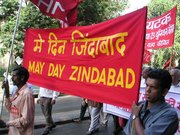May Day
|
|
- For the distress signal, see: Mayday; For the James Bond villain see May Day (James Bond)
May Day is a name for various holidays celebrated on May 1 (or in the beginning of May).
| Contents |
Labour association

The holiday is most often associated with the commemoration of the social and economic achievements of the labor movement. The 1 May date is used because in 1884 the Federation of Organized Trades and Labor Unions, inspired by Labor's 1872 (http://www.nupge.ca/news_2003/n01se03a.htm) success in Canada, demanded an eight-hour workday in the United States, to come in effect as of May 1, 1886. This resulted in the general strike and the U.S. Haymarket Riot of 1886, but eventually also in the official sanction of the eight-hour workday.
May Day is designated International Workers Day. It is indeed a thoroughly international holiday; and the United States is one of the few countries in the world where pressure from local working classes has not led to an official holiday. In the 20th century, the holiday received the official endorsement of the Soviet Union; celebrations in communist countries during the Cold War era often consisted of large military parades and shows of common people in support of the government.
There is some suggestion that Labor Day in the United States was created specifically to avoid commemoration of May Day. The adoption of May Day by communists and socialists as their primary holiday cements official resistance to Labor Day and similar non-May Day celebrations, which they view as being controlled by the ruling class. (See Loyalty Day.)
Canada, Australia, New Zealand and the Netherlands also celebrate Labour Day on different dates; that has to do with how the holiday originated in those countries. May Day has long been a focal point for demonstrations by various communist, socialist, and anarchist groups.
In a separate attempt to co-opt May Day, the Roman Catholic Church added another Saint Joseph's Day in 1955 that Christianized this holiday as the day of "Saint Joseph, the Worker".
Germany

Berlin, Germany, particularly in the districts of Kreuzberg and Prenzlauer Berg, traditionally has yearly demonstrations on May Day. In 1929, the social democratic SPD government prohibited the annual May Day workers' demonstrations in Berlin. The communist party KPD, which was the strongest party in Berlin, called demonstrations nonetheless. By the end of the day, 32 demonstrators, workers and bystanders had been killed by the police, at least 80 were seriously injured. The Berlin police, under control of a social democratic government, had fired a total of 11,000 rounds of live ammunition.
This incident, remembered as Blutmai (ger.) (blood May) deepened the split between the workers' parties KPD and SPD. This was an advantage for the Nazis, which became Germany's governing party in 1933 and adapted May Day to their purposes, calling it "day of work" which is still the official name for this public holiday.
In today's Germany May Day is still of political importance, with labor unions and parties using this day for political campaigns and activities, but since 1987 it has also become known for heavy rioting by radical leftists, including the punk rock scene, Autonome and others, but also "regular" youths not fond of the police. But violence from the political left has been on the decline in recent years, with May Day 2005 in Berlin being the most peaceful in nearly twenty years.
In recent years, neo-nazis and other groups on the far right like the NPD have also used the day to schedule public demonstrations, often leading to clashes with protesters, which turned especially violent in the historical city of Leipzig in 1998 and 2005.
In rural regions of Germany, Walpurgisnacht celebrations of pagan origin are traditionally held on the night before May Day, including bonfires and the wrapping of May Poles, and young people using this opportunity to party, while the day itself is used by many families to get some fresh air, wurst and beer.
English tradition
CotswoldMorrisHandkerchiefs20040501_CopyrightKaihsuTai.jpg
Traditional English May Day rites and celebrations include Morris dancing, crowning a May Queen, celebrating Green Man day and dancing around a Maypole.
In Oxford on May Day, many pubs are open from sunrise, and some of the college bars are open all night. Madrigals are still sung from the roof of the tower of Magdalen College, with thousands gathering on Magdalen Bridge to listen. Traditionally, revellers have jumped from the bridge into the River Cherwell below as part of the celebrations with some 100 people having done so in 2005. The river, however, is only 3ft deep in places and more than half of those jumping necessitated some form of medical treatment.
In more recent years the event has split into two camps (excluding the traditonal celebrations described before). The left-wing workers movement celebrates May Day on the first monday after May the first (which may or may not actually occur on 1 May). This day is a bank holiday, and on it small scale rallies are held by political parties (generally including, but not limited to, the Labour Party, The Socialist Workers Party, The Scottish Socialist Party, The Communist Party of Great Britain and other left-wing groups). These occassions are typified by the selling of propaganda materials, and beer tents in parks. The actual date of May 1 generally features rallies and marches organised by anarchist groups, although in recent years these have also involved far-left communist and Trotskyite groups.
Elsewhere
May Day also marks springtime celebrations such as:
- Walpurgis Night in Northern Europe, including the Finnish Vappu celebrations
- Beltane in Ireland and Scotland
- Roodmas
These holidays were also respected by some early European settlers of the American continent.
External links
- May Day Celebration Committee New Haven Connecticut (http://www.maydaynewhaven.org)
- Magdalen College description of May Morning in Oxford (http://www.magd.ox.ac.uk/history/cc_hymnus.shtml)
- May Day 2005 New York City Celebrations and Protests - Pictures (http://www.nowpublic.com/node/9329)
- May Day Remembrance: A memoriam for those who died under Communist regimes (http://catallarchy.net/blog/archives/2005/05/01/may-day-2005-a-day-of-remembrance/)de:Erster Mai
es:Día Internacional del Trabajo fi:Vappu fr:Fête du Travail he:אחד במאי it:Festa dei lavoratori pl:Święto Pracy ja:メーデー sv:Första maj ru:Праздник весны и труда sl:Praznik dela sv:Första maj zh:国际劳动节
